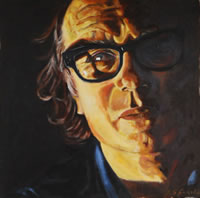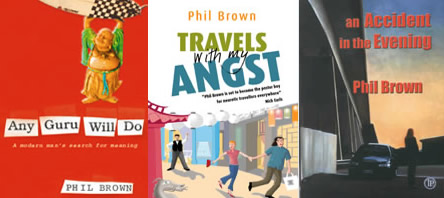Interview with Dr. Norman Doidge ...
by Phil Brown
Published in The Courier-Mail
It says something about the Zeitgeist that a bloke writing about the brain can become a publishing sensation.
In an age when many of us live in mortal terror of Alzheimer's disease, the news that the brain is actually more resilient than we thought and that Alzheimer's can be slowed down - or even kept at bay - is welcome, indeed.
The Canadian psychiatrist, psychoanalyst, researcher and author, Norman Doidge, who wrote the 2007 bestseller The Brain That Changes Itself (it sold more than one million copies) and has just released what could be called a sequel, The Brain's Way of Healing, is something of a reluctant superstar.
Doidge, 61, is coming to Brisbane on May 19.2014 to promote his new book and to appear at an event, at Brisbane Powerhouse, which is expected to be a sellout.
Doidge has form here and was the surprise sensation (he was surprised, we were surprised) at Brisbane Writers Festival in 2010.
He was the festival's best-selling author that year, much to the chagrin of some of the fiction posse. Doidge garnered a legion of local fans on that visit, many of them, it must be admitted, women of a certain age. We're talking thinking woman's crumpet here.
News that another visit is imminent has hearts and minds aflutter. Doidge himself is still somewhat taken aback by the success of what are essentially books about science and medicine, albeit couched in human narratives that make them eminently readable.
'I couldn't have predicted what would happen with The Brain That Changes Itself," Doidge says over the phone from his home in Toronto.
'But, in my writing, I have generally found that if I find something interesting, others will too, but there's never a guarantee of that." Doidge has the happy knack of explaining science and of presenting discoveries about the human brain through storytelling, the result of his professional and personal odyssey in search of the truth about our grey matter.
He isn't the first author to popularise neuroscience, however, a fact he readily acknowledges, pointing to Oliver Sacks' seminal 1985 book, The Man Who Mistook His Wife For a Hat, which was an inspiration for a generation that included Doidge.
'It was a magical moment for me, discovering that someone who was a neurologist was writing in that way," Doidge says.
'It was such an accomplished book and it really changed the way people thought about the brain." It was also a good read and, like Sacks, Doidge employs case studies and human dramas as a way of disseminating scientific information.
His new book is about the discovery that the human brain has its own unique way of healing and in it he dispels the myth that the brain is fixed and unregenerative and unable to recover from damage or illness.
In The Brain's Way of Healing Doidge turns those beliefs on their heads and explores the phenomenon of neuroplasticity - the discovery that the brain can change its own structure and function in response to mental experience.
This is regarded as the most important change in our understanding of the brain and mind since the beginning of modern science and in The Brain's Way of Healing, Doidge shows how the amazing process of neuroplastic healing really works.
Empowering the brain to heal by means of stimulation - light, music, diet, exercise - can improve, or even cure, many conditions thought to be irreversible, and that may explain why people hang on Doidge's every word.
We are so bombarded with negative prognoses for the future that good news on the brain front is most welcome.
'I suppose part of the attraction of my book is that there is good news regarding dementia," Doidge says.
'The fact is that there are things that people can do to reduce it." In a chapter called A Man Walks Off His Parkinsonian Symptoms (he acknowledges that title has an Oliver Sacks ring to it), Doidge writes about John Pepper, a man who has fought Parkinson's simply by walking.
Sounds simple? And it is, but it poses another question, as Doidge writes: 'The question inevitably arises: If walking can turn back Parkinson's symptoms, and can delay the onset of Huntington's, both degenerative diseases, might it have a role to play in the commonest degenerative disease of the brain - Alzheimer's disease? The question is especially important because there are no effective medications for Alzheimer's." Doidge goes on to outline a study that showed walking 'was a key contributor to a very simple program that eradicated the risk of dementia by a staggering 60 per cent".
Doidge's fans will be lacing up their walking shoes after reading that. As well as meeting a patient who has walked off his Parkinson's, Doidge also introduces us to doctors, therapists and patients who are healing the brain without surgery or medication.
We meet patients who have alleviated years of chronic pain; children on the autism spectrum or with ADD or learning disorders who have used neuroplastic techniques to complete a normal education and become independent; sufferers who have seen symptoms of multiple sclerosis, brain injuries and cerebral palsy radically diminish.
This is not quackery and although not everyone is on board with Doidge, the medical profession is taking note of his work, even if he sounds a bit like a new-age guru at times.
His contention that the wisdom of the ancients and that Eastern traditional healing techniques have something to them, raised some eyebrows.
Shamans and other ancient healers claimed to harness the mystical powers of mind and spirit and Doidge's contention is that this wasn't all nonsense.
'It's really a kind of modern parochial prejudice to think that people in ancient times were less observant or intelligent than us," Doidge says.
'Their brains were as evolved, it's just that they didn't have the knowledge that we do, although they knew more about botany and herbs and, in Eastern medicine the meridian system has endured for several thousand years because there is something to it.
'Western medicine has its own strengths and I think neuroplasticity provides a bridge between two grand traditions." But a sense of mystery regarding all this pervades and is an inherent part of the whole story, because Doidge admits that the brain itself is still, well, mysterious.
'I think we're still quite far from a full understanding of how the brain works," he says.
'The brain is so complicated and no one has yet cracked the neural code, no one knows how the brain encodes thought. People talk as if they do, but they don't.
'I am humbled by how much I still don't know about the brain." And that will only endear him even more to his fans.
Doidge is becoming a global phenomenon with his books translated into 10 languages, and with more books planned.
The books keep selling and grown women grow faint at the mere mention of his name. This has the balding, bearded, unlikely literary superstar bemused but grateful, because it helps him get the word out about neuroplasticity - and he's more interested in that than in being a celebrity.
Published in The Courier-Mail
PHIL BROWN
Arts Editor - The Courier-Mail, Deputy Editor - CANVAS, News Queensland

Column Menu

... more about Brain Plasticity
Brain Plasticity is a term used to explain the now well recognised capabilities of the brain to change (plasticity) in reaction to body or mental stimuli.
The term has become familiar in recent years due to the release of excellent scientific research that have been highlighted in two fascinating books.
The Brain That Changes Itself
The Brain's Way of Healing
... by Norman Doige, MD
Copyright © Phil Brown

